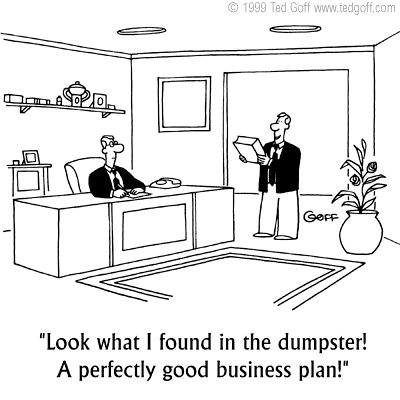This article is the third part of a series of articles on 7 Myths about building a business. Today’s article deals on Myth 4: “Successful businesses make their best moves by strategic formal business plan”
If you search for the keyword ‘Business Plan’ on Amazon book store; guess how many books will turned out – about 116,538 Results.
There are many authors writing step-by-step guides and consultants selling business-planning services. Organisations and government agencies hosting business plan competitions for aspiring entrepreneurs; YOUWIN Business plan competition comes to mind.
Experts promote writing a formal business plan as a process to greatly improve your chances of success. After all, it is much easier to teach writing a business plan than the underlying qualities of entrepreneurial spirit; the ability to learn and adapt through experience.
As a result, instead of spending much of the initial enthusiasm and drive on taking action and learning by doing, aspiring entrepreneurs spend months to years perfecting a business plan that include financial projections, market research, and how they intend to sell to 2% of a larger population and make huge profit.
How important is a formal business plan for a start-up?
Imagine playing chess game with a planned out strategy. You have your SMART moves mapped out even before the game gets started. You start with your plan at heart; probably the 8-move checkmate. You’ve got it all figured out… All you need now is to go forth and conquer your opponent, right?
Well, unless your opponent is a low end amateur, you are very likely to be disappointed as you get into the real game. It’s ok to have a plan at the start of the game but that is if you know the game and your opponent well enough. What better way to know the game and your opponent than to actually play the game?
Now think about an amateur chess player with a plan to defeat a chess-pro. He is optimistic, tenacious and every word that describes David defeating Goliath. If we are being honest, regardless of how determined this amateur player may be; how SMART his plan and strategy, his chances of winning a chess-pro is often unrealistic.
Writing a traditional business plan before starting a business you have little to no experience in is like going to play a chess-pro when the only thing you know about chess is how the pieces move.
Rather than spend time devising a smart plan to conquer an alien market, wouldn’t you rather get in and start playing? Wouldn’t you rather learn as much as you can about the game by playing, developing skills and experiences, and understanding the game better?
What difference does the formal Business Plan make for nascent entrepreneurs?
There is an unending debate about the importance of writing a formal business plan for start-ups or not.
Some entrepreneurs believe a business plan is a must for entrepreneurs, while others downplay its importance.
I attended a one-month entrepreneurship training few years ago, where participants are required to come up with an idea, do market research, write a bankable business plan under the supervision of a business development specialist and defend your project before a panel of judges at the end of the training.
We were often told that the business plan is like your Business Bible; your most priced business tool guiding your through your business journey.
On contacting my fellow course mates about one year after the program, I discovered a common pattern; those of us who already had a business before attending the training were still in business but most who had no business before they joined were still in the ‘about to start’ phase. Not even a course on formal business plan could get them started after one year.
It’s hard to reach a conclusion on this alone, but we can safely accept that no amount of work put into writing a formal business plan can equate getting started.
How successful businesses evolve
American Express began life in 1850 as a regional freight express business (equivalent to the United Parcel Services –UPS). However the company accidentally shifted into a financial services company, to create “American Express Travellers Cheque”.
This was not part of the plan at the inception of the company but in an attempt to exploit opportunities and solve an impending problem, the travellers cheque further evolves American Express towards financial and travel services.
Through a series of incremental steps – most of them opportunistic and certainly not part of any strategic business plan – American Express evolved into something entirely different from its original founding concept of freight business.
What is the first thing that comes to mind at the mention of the name HP? Computers, right? Was that part of the strategic business plan? In 1965, Hewlett Packard – HP designed its first small computer to add power to its line of instruments products. The former Chief executive, John Young explained:
It was basically an under the bench thing. We didn’t even call it a computer. We called it an ‘instrument controller’. Although we knew computers would be important in the future, we wanted to maintain our reputation as an instrument company and did not want to be known as a computer company.
This does not suggest that successful businesses do not make strategic business plans. Rather that they allow themselves to be flexible, adapt and evolve their business according to opportunities and market need, and not based on a rigid business plan. And most importantly, these businesses believe that their greatest product is not what they produce and sell, but the company itself.
This is a concept Jim Collins called the ‘evolutionary progress’, based on the evolutionary theory of survival of the fittest; try a lot of stuffs, keep what works, discard those that don’t work. He wrote:
Visionary companies make some of their best moves by experimentation, trial and error, opportunism and by accident. What looks like a brilliant foresight and preplanning was often the result of “Let’s just try a lot of stuff and keep what works.”
They usually begin with small incremental steps, often in the form of quickly seizing unexpected opportunities (rather than spend time on formal business plan) that eventually grow into major, and often unanticipated, strategic shift.
For instance, had American Express not evolved into Financial and travel services, it would have disappeared with most freight companies after the US government nationalized all freight express businesses in 1918, creating a catastrophic industrial change.
This proves that the formal business plan does not fit the title of the ‘business bible’ for entrepreneurs. Rather the entrepreneur is often guided by his intuition and drive for progress, than a formal document.
The entrepreneur, the formal Business Plan and what makes them thick
1. A study released by Babson College analyzed 116 businesses started by alumni who graduated between 1985 and 2003. Comparing success measures such as annual revenue, employee numbers and net income, the study found no statistical difference in success between those businesses started with formal written plans and those without them. The study concludes that “unless you need to raise external start-up capital from institutional sources or business angels, you do not need to write a formal business plan.”
2. Benson Honig, a professor at Wilfrid Laurier University in Ontario, Canada, says his research of 396 nascent entrepreneurs in Sweden from the late 1990s also found no correlation between business planning and profitability. Instead, his study found the biggest predictor of success to be knowing customers in advance. Mr. Honig says he teaches “contingency planning” to his students — or thinking about a business as constantly progressing, changing and making decisions based on the market climate — instead of traditional business planning.
3. While writing their book – Heart, Smarts, Guts and Luck, Anthony Tjan and his colleagues interviewed and surveyed hundreds of successful entrepreneurs around the globe to better understand what it takes to be an entrepreneur and build a great business. One of their most striking findings was that, of the entrepreneurs surveyed, about 70% did not start with a business plan. Instead their business journey originated from their heart. Clarity of purpose and passion ruled the day with less time spent writing about an idea and more time spent just doing it.
He said, “It’s not that all planning is bad. It’s that efforts to write the ‘perfect’ business plan usually lead to being precisely incorrect rather than approximately correct. One problem is that the content that most people focus on in business plans has little to do with the reality that will actually emerge. Many start-up plans emphasize some gigantic potential market and how getting just the smallest silver of it will make them and investors rich“.
Most business plans are the works of people predicting the future, documenting uncertainties and making assumptions. The best content for your business plan is real-world data based on testing and experimenting of ideas.
Do you need a business Plan to start a business?
The plan is useless; it’s the planning that’s important
Dwight D Eisenhower
The concept that the business plan itself means very little isn’t a new idea. Who would think spending a year creating a business plan is a good exercise? Or that a document is more important than people? Or that formal business plan signifies success?
The business planning process is like a steering is to driving; it takes constant adjustment and adaptation to stay on course.
In an article on WSJ, “Do Start-Ups Really Need Formal Business Plans?”, the author wrote;
A more practical approach for entrepreneurs who aren’t seeking external start-up financing from venture capitalists or angel investors, is to write a “back-of-the-envelope” plan with basic financial projections, such as cash flow, and fine-tune the business model after launching the business… ‘Just do it’
This is the concept of Ready; Fire; Aim. Not Ready; Aim; Fire. You Plan as you go.
The point is that a business plan does not make a business; strategic action does. If you don’t get on the field and start gaining market experience, what you will have in a formal business plan is most often hyped figures and speculations. Use real experience to expand your plan.
This article is the fourth part of a series of articles on 7 Myths about building a business.
Myth 1: “It takes a great idea to start a business”
Myth 2: “Successful business requires great and charismatic visionary leaders”
Myth 3: “Successful businesses exist solely to make money”










